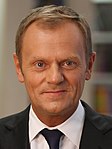The Civic Platform is a centre to centre-right liberal conservative political party in Poland. Since 2021, it has been led by Donald Tusk, who previously led it from 2003 to 2014 and was President of the European Council from 2014 to 2019.

From 1989 through 1991, Poland engaged in a democratic transition which put an end to the Polish People's Republic and led to the foundation of a democratic government, known as the Third Polish Republic, following the First and Second Polish Republic. After ten years of democratic consolidation, Poland joined NATO in 1999 and the European Union on 1 May 2004.

Law and Justice is a right-wing populist and national-conservative political party in Poland. Its chairman is Jarosław Kaczyński.
Poland has a multi-party political system. On the national level, Poland elects the head of state – the president – and a legislature. There are also various local elections, referendums and elections to the European Parliament.

Parliamentary elections were held in Poland on 25 September 2005. All 460 members of the Sejm and 100 senators of the Senate were elected. The election resulted in a sweeping victory for two opposition parties: the right-wing, national-conservative Law and Justice (PiS) and the centre-right, liberal-conservative Civic Platform (PO). The incumbent centre-left government of the Democratic Left Alliance (SLD) was soundly defeated. PiS won 155 seats and PO 133, while the governing SLD was reduced to fourth place with 55 seats, behind Andrzej Lepper's Self-Defence party, which won 56 seats.

Presidential elections were held in Poland on 9 October and 23 October 2005. The outgoing President of Poland, Aleksander Kwaśniewski, had served two five-year terms and was unable to stand for a third term. Lech Kaczyński defeated Donald Tusk to become President of Poland.

Parliamentary elections were held in Poland on 23 September 2001. All 460 members of the Sejm and 100 senators of the Senate were elected. The election concluded with an overwhelming victory for the centre-left Democratic Left Alliance – Labor Union, the electoral coalition between the Democratic Left Alliance (SLD) and the Labour Union (UP), which captured 41% of the vote in the crucial lower house Sejm. The 2001 election is recognized as marking the emergence of both Civic Platform (PO) and Law and Justice (PiS) as players in Polish politics, while also witnessing the outright collapse of the Solidarity Electoral Action (AWS) and its former coalition partner, the Freedom Union (UW).

The 2006 Polish local elections were held in two parts. with its first round on November 12 and the second on November 26, 2006. In the election's first round, voters chose 39,944 gmina councillors, 6,284 powiat councillors and 561 deputies to provincial voivodeship sejmiks. Additionally, 2,460 city and town mayors, borough leaders and other officials were decided by direct or runoff elections in the second round. The elections were seen as a test to the government of Prime Minister Jarosław Kaczyński, whose coalition between his own Law and Justice party and its junior coalition partners, the Self-Defense of the Republic of Poland and the League of Polish Families, had undergone a severe crisis two months prior.

Presidential elections were held in Poland on 20 June 2010. As no candidate received a majority of votes in the first round, a second round was held on 4 July 2010. Bronisław Komorowski, the acting President of Poland and vice-chairman of the Civic Platform, defeated Jarosław Kaczyński, twin brother of recently deceased President Lech Kaczyński and chairman of Law and Justice (PiS). The global financial crisis, flooding in Poland and the Smolensk disaster were the main themes in the last months of the election campaign.

League and Self-Defense was a short-lived Polish political alliance between the left-wing populist Self-Defense of the Republic of Poland (Samoobrona) and the national conservative Christian right League of Polish Families (LPR) in July 2007. The alliance was directed against right-wing populist Law and Justice (PiS) that first formed a coalition with both parties, but then gradually marginalized them and shuffled away their ministers. The coalition was marked by mutual distrust as the parties had radically different outlooks, tied together by Euroscepticism, opposition to capitalism and aversion to PiS. The coalition was only polling 6%, and was dissolved by September 2007, shortly before the election. In the 2007 Polish parliamentary election, both LPR and Samoobrona failed to reach the 5% electoral threshold, losing all their 92 Sejm and 10 Senate seats. The downfall of both parties is considered to have been caused by PiS appropiating their political rhetoric.

Poland Comes First, also rendered as Poland is the Most Important, shortened to Poland First, and abbreviated to PJN, was a centre-right, conservative liberal, political party in Poland. It was formed as a more moderate breakaway group from Law and Justice (PiS). By early 2011, the party had eighteen members of the Sejm, one member of the Senate, and three members of the European Parliament. Poland Comes First ceased to exist as a political party in December 2013, when it joined the new centre-right party led by Jarosław Gowin named Poland Together.

Parliamentary elections were held in Poland on 9 October 2011. All 460 members of the Sejm and 100 senators of the Senate were elected. The ruling Civic Platform (PO) won a plurality of seats and Tusk became the first Polish prime minister to be appointed for a second consecutive term since the fall of communism. Both the Civic Platform and its junior partner, the Polish People's Party (PSL), agreed to continue their governing coalition after the election.

The 2010 Polish local elections were held in two parts, with its first round on 21 November and the second on 5 December. The first round included elections of deputies to provincial voivodeship sejmiks, as well for gmina and powiat councilors. The second round of elections were marked for mayors, borough leaders, and other positions decided by runoff elections. The local elections were seen as a test to the ruling Civic Platform and Polish People's Party coalition government under Prime Minister Donald Tusk.

Parliamentary elections were held in Poland on 25 October 2015. All 460 members of the Sejm and 100 senators of the Senate were elected. The election was won by the largest opposition party, the right-wing Law and Justice (PiS), with 38% of the vote against the governing Civic Platform (PO), which achieved 24%. Official results, announced on 27 October, gave Law and Justice 235 of the 460 seats, a majority of four. PiS vice chairwoman Beata Szydło succeeded PO leader Ewa Kopacz as Prime Minister of Poland, heading a one-party cabinet.

Parliamentary elections were held in Poland on 13 October 2019. All 460 members of the Sejm and 100 senators of the Senate were elected. The ruling right-wing Law and Justice (PiS) won re-election to a second term retaining its majority in the Sejm. However, it lost its majority in the Senate to the opposition. With 43.6% of the popular vote, Law and Justice received the highest vote share by any party since Poland returned to democracy in 1989. The turnout was the highest for a parliamentary election since the first free elections after the fall of communism in 1989. For the first time after 1989, the ruling party controlled one house, while the opposition controlled the other.
The United Right was a parliamentary group formed by Jarosław Gowin and Zbigniew Ziobro with their respective parties, Poland Together and United Poland. After their cooperation at 2015 Polish parliamentary election with the Law and Justice party, 'United Right' became a media label for the ruling right-wing political alliance of Law and Justice with its aforementioned partners in Poland.

The European Coalition was a short-lived electoral alliance and list in Poland. It was established on the verge of 2019 European Parliament election by a group of former prime ministers and former foreign ministers, including Jerzy Buzek, Ewa Kopacz, Grzegorz Schetyna and Radosław Sikorski. They declared the will to construct "one broad list in European Parliament election, the aim of which would be to restore Poland's strong position in the European Union". The Coalition is to be pro-European and centrist.

Parliamentary elections were held in Poland on 15 October 2023, per the Polish Constitution. Seats in both the lower house, the Sejm, and the Senate were contested. At the polls, a referendum - containing four questions concerning economic and immigration policy of the government - was also voted on.
Presidential elections will be held in Poland on or before 18 May 2025 at the latest, though they can be held earlier should the office become vacated as a result of death, resignation or removal from office of the incumbent. Due to constitutional term limits allowing a president to serve only two terms, incumbent president Andrzej Duda is ineligible for re-election. Presidential elections in Poland must take place on a free day between 75 and 100 days before the term's end.

People's National Movement was a parliamentary group in the 5th legislature (2005–2007) of Sejm of the Republic of Poland. It was founded on 22 September 2006 by former MPs of Self-Defence of the Republic of Poland and League of Polish Families and was a response to both parties distancing themselves from Law and Justice, which they considered breaking their coalition agreement with. The goal of the People's National Movement was to keep the coalition with Law and Justice at any cost.
























